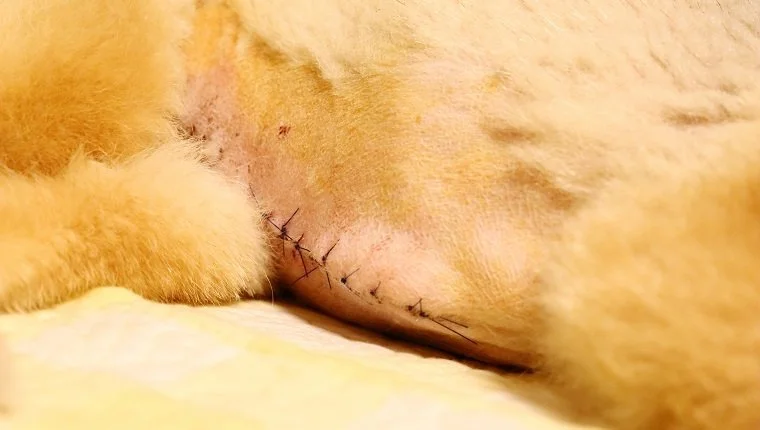Your dog has hernia and you’re wondering what to do about it? Hernias in dogs are when the intestines, stomach, liver, or spleen slip through an opening in the abdominal wall. A vet will be able to diagnose your pet’s condition by doing an examination.
The vet may recommend surgery if there is a lot of pressure on surrounding organs or if your dog is showing signs of pain. If not, they might prescribe medication that can help manage symptoms.
What is a Hernia and what does it do
When it comes to our furry friends, few things are as important as their health. And one health issue that many dog owners may not be aware of is hernias.
When a dog has hernias, it can be due to many things such as being born with the condition or having been injured and incurred damage in some way.
This type of abdominal muscle weakness also goes hand-in-, even with pregnant female dogs because their bodies are expanding significantly while they’re carrying puppies inside them!
How to tell if your dog has a hernia
If you have a dog, it is important to know the signs of a hernia so that you can take them in for treatment as soon as possible.
A hernia occurs when an organ or tissue puts pressure on a weak spot in the muscle wall. Some things to look out for are coughing, difficulty breathing, and pain around the stomach area.
- The most common symptom of a hernia is straining to defecate
- If the dog has difficulty urinating, it may have a hernia
- If your dog’s abdomen looks swollen or distended, it could be suffering from a hernia
- Another sign that your pup might have this condition is if they are experiencing abdominal pain or vomiting
- You can confirm that your dog does in fact have a hernia by taking them to the vet for an x-ray and examination
- It’s important to take care of any underlying health issues before you start treating the symptoms of their hernia
If your dog has these symptoms then they may have a hernia and should see their veterinarian right away.
Types of hernias in dogs
Umbilical: Umbilical hernias in puppies can be difficult to diagnose. They are usually over the area of a protrusion that forms near an animal’s navel, which makes them very easy for veterinarians and owners alike who notice this type of lumpy growth on your pup!
These lumps could have been there since birth or may emerge shortly after they’re born; either way, we recommend taking him/her to see our vet immediately if you find one because left untreated these will lead to serious complications down the road such as infection.
Inguinal: These hernias can be found in the groin area, just below where you would expect to find your abdomen.
They’re most commonly detected during pregnancy and male bodies are also at risk for them because of their larger size compared with females who may develop this condition primarily as middle-aged female dogs.
However, it does occur across all ages categories including young puppies too! If left untreated then there could potentially arise complications such as severe pain which could lead down a dangerous path requiring surgery immediately before something worse happens.
Diaphragmatic: Do you know what the diaphragm is? It’s a big muscle that covers nearly half of your dog’s torso and helps with breathing. If there are holes in it, they might struggle when exercising or inhaling deeply because their lungs can’t expand fully like normal! This condition usually happens at birth but also due to trauma such as being hit by a car while running away from them.
Perineal: The perineal hernia is a type of abdomen wall defect that can be seen in dogs over the age of 5 without being neutered. The pelvic muscle tears and allows abdominal contents to enter near your anus area, certain breeds may have an increased chance for this such as collies boxers, or Boston terriers
Hiatal: Hiatal hernias occur when a part of the stomach pushes into where it meets the esophagus. This can be either congenital or due to trauma, but there are some breeds that seem prone: brachycephalic dogs such as bulldogs and French Bulldogs for example because they produce too much pressure with their flat faces which causes this type of error in a structure called “hyperextension.”
Treatment options for hernias in dogs
Dogs are susceptible to hernias, just like people. Hernias occur when an organ or tissue pushes through a weakened area in the muscle or fascia.
There are several treatment options like Prognosis for hernias in dogs, depending on the severity of the condition.
Surgery is often the best option, but there are also non-surgical treatments that can be effective.
Understanding the various treatment options is important for dog owners so they can make the best decision for their pets.
Dog hernia after surgery

Your dog will be given pain relief medication and advised to keep them calm for 10 days after surgery. This is so the skin incision can heal, reducing the risk of dehiscence (the sutures coming away).
If your pup has any type or amount of bleeding during this time frame it needs medical attention right away because there could potentially still remain some infection in their system from what was harvested during the procedure- which means more problems down the road for both you as well! Make sure to monitor closely with regularity throughout the healing process.
Prevention methods for canine hernias
- Know the symptoms of canine hernias
- Get your dog checked by a veterinarian if you think they might have one
- Keep an eye on your dog’s weight to help avoid hernia occurrence
- Feed them healthy food that is low in salt and fat, especially for senior dogs
- Exercise with your dog regularly – it will keep their body strong and reduce the risk of hernias
- Reduce stress levels as much as possible for your pet – this can include taking shorter walks or playing less fetch outside, limit interactions with other animals who may be aggressive, don’t let them jump up or down from furniture or beds often, etc…
Conclusion
The best way to figure out your dog’s hernia and the treatment is by visiting a veterinarian. Your vet will be able to tell you if it’s an inguinal, femoral or incisional hernia and recommend treatment options for each type of case.
If that sounds like too much work then just read on below- we’ve got some great information about how different types of dogs get their hernias in the first place!
As always please consult with your veterinarian before taking any action. We hope this article was helpful and informative!

